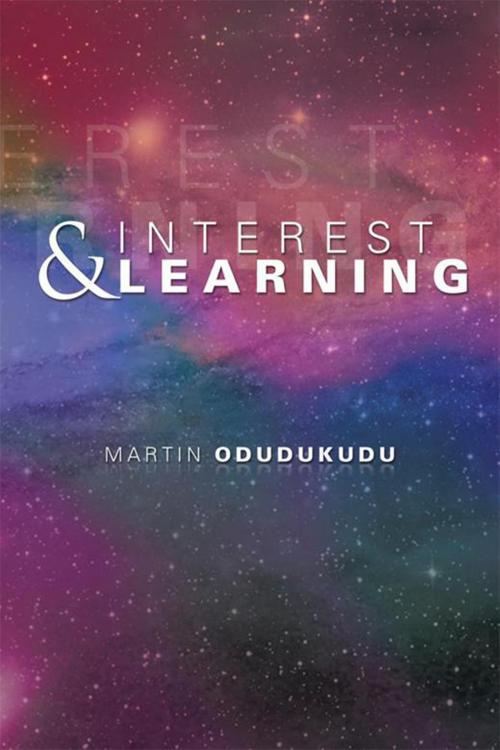| Author: | Martin Odudukudu | ISBN: | 9781483624310 |
| Publisher: | Xlibris US | Publication: | April 22, 2013 |
| Imprint: | Xlibris US | Language: | English |
| Author: | Martin Odudukudu |
| ISBN: | 9781483624310 |
| Publisher: | Xlibris US |
| Publication: | April 22, 2013 |
| Imprint: | Xlibris US |
| Language: | English |
In Interest and Learning, we advance a theory of interest which says interest is neither about allowing students to do what they like nor about imposing tasks upon students. Rather, we point out that interest is about facilitating students to see advantage in relevant tasks. We define interest not in terms of tendencies students express when a student sees and object and seeks to secure it; rather, we define interest in terms of tendencies a student expresses when he finds self in the midst of object/events, and student seeks advantage among events. Thus, we define interest in accordance with original conceptions back of the word interest which has its roots in the Latin or old French language. In other words, we define interest based upon what the French were thinking about when they coined the word, interest. In French, the original word is inter esse, meaning to be in the midst/center of ones objects or problems. What a reader of this book will find is that one in the midst of object/events, without thinking, is more or less like another object, with little or no knowledge of the events. In the midst of objects, one seeks to extricate self from objects/problems, therefore, one thinks. One begins to differentiate/characterize objects and reclaim self from objects. Differentiating and/or characterizing objects in order to extricate self from them is properly captured in Descartes popular phrase "I think, therefore, I am." In this book, the reader will find that thinking not only differentiates self from objects, but also that thinking helps to defines relationship among object. In other words, thinking that differentiates self from objects (relates to interest) is not the same as thinking that defines relationships among object (relates to desire). The former seeks to determine advantage through concepts but the latter seeks to secure an advantage through objects. Grasping concepts of person differentiating/characterizing objects/problems in order to extricate self from objects/problems is almost impossible especially because most empiricists believe that human beings are essentially objects; empiricists cannot see how an object thinks and to thus differentiate itself from other objects. The result is that a correct and functional definition of interest has been obscured. Many empiricists do not believe that human thinking is unique and/or is different from contingent occurrences. In this book, we expound a theory of thinking that point out that thinking relating to interest differs from thinking that relating to desire. The former determines an advantage through concepts and the latter secures an advantage through objects.
In Interest and Learning, we advance a theory of interest which says interest is neither about allowing students to do what they like nor about imposing tasks upon students. Rather, we point out that interest is about facilitating students to see advantage in relevant tasks. We define interest not in terms of tendencies students express when a student sees and object and seeks to secure it; rather, we define interest in terms of tendencies a student expresses when he finds self in the midst of object/events, and student seeks advantage among events. Thus, we define interest in accordance with original conceptions back of the word interest which has its roots in the Latin or old French language. In other words, we define interest based upon what the French were thinking about when they coined the word, interest. In French, the original word is inter esse, meaning to be in the midst/center of ones objects or problems. What a reader of this book will find is that one in the midst of object/events, without thinking, is more or less like another object, with little or no knowledge of the events. In the midst of objects, one seeks to extricate self from objects/problems, therefore, one thinks. One begins to differentiate/characterize objects and reclaim self from objects. Differentiating and/or characterizing objects in order to extricate self from them is properly captured in Descartes popular phrase "I think, therefore, I am." In this book, the reader will find that thinking not only differentiates self from objects, but also that thinking helps to defines relationship among object. In other words, thinking that differentiates self from objects (relates to interest) is not the same as thinking that defines relationships among object (relates to desire). The former seeks to determine advantage through concepts but the latter seeks to secure an advantage through objects. Grasping concepts of person differentiating/characterizing objects/problems in order to extricate self from objects/problems is almost impossible especially because most empiricists believe that human beings are essentially objects; empiricists cannot see how an object thinks and to thus differentiate itself from other objects. The result is that a correct and functional definition of interest has been obscured. Many empiricists do not believe that human thinking is unique and/or is different from contingent occurrences. In this book, we expound a theory of thinking that point out that thinking relating to interest differs from thinking that relating to desire. The former determines an advantage through concepts and the latter secures an advantage through objects.















